Acer TRAVELMATE 5100, TRAVELMATE 5600 User Manual
TravelMate 5600/5100 Series
User's Guide
Copyright © 2006. Acer Incorporated.
All Rights Reserved.
TravelMate 5600/5100 Series User's Guide
Original Issue: 01/2006
Changes may be made periodically to the information in this publication without obligation to notify any person of such revisions or changes. Such changes will be incorporated in new editions of this manual or supplementary documents and publications. This company makes no representations or warranties, either expressed or implied, with respect to the contents hereof and specifically disclaims the implied warranties of merchantability or fitness for a particular purpose.
Record the model number, serial number, purchase date and place of purchase information in the space provided below. The serial number and model number are recorded on the label affixed to your computer. All correspondence concerning your unit should include the serial number, model number and purchase information.
No part of this publication may be reproduced, stored in a retrieval system, or transmitted, in any form or by any means, electronically, mechanically, by photocopy, recording or otherwise, without the prior written permission of Acer Incorporated.
TravelMate 5600/5100 Series Notebook PC
Model number: __________________________________
Serial number: ___________________________________
Date of purchase: ________________________________
Place of purchase: ________________________________
Acer and the Acer logo are registered trademarks of Acer Incorporated. Other companies' product names or trademarks are used herein for identification purposes only and belong to their respective companies.

iii
Disposal instructions
Do not throw this electronic device into the trash when discarding. To minimize pollution and ensure utmost protection of the global environment, please recycle.
USA
For electronic products containing an LCD/CRT monitor or display:
Lamp(s) inside this product contain mercury and must be recycled or disposed of according to local, state or federal laws. For more information, contact the Electronic Industries Alliance at www.eiae.org. For lamp-specific disposal information, check www.lamprecycle.org.

iv
First things first
We would like to thank you for making an Acer notebook your choice for meeting your mobile computing needs.
Your guides
To help you use your Acer notebook, we have designed a set of guides:
First off, the Just for Starters... poster helps you get started with setting up your computer.
The printed User's Guide introduces you to the basic features and functions of your new computer. For more on how your computer can help you to be more productive, please refer to the AcerSystem User's Guide. This guide contains detailed information on such subjects as system utilities, data recovery, expansion options and troubleshooting. In addition it contains warranty information and the general regulations and safety notices for your notebook. It is available in Portable Document Format (PDF) and comes preloaded on your notebook. Follow these steps to access it:
1Click on Start, All Programs, AcerSystem.
2Click on AcerSystem User's Guide.
Note: Viewing the file requires Adobe Reader. If Adobe Reader is not installed on your computer, clicking on AcerSystem User's Guide will run the Adobe Reader setup program first. Follow the instructions on the screen to complete the installation. For instructions on how to use Adobe Reader, access the Help and Support menu.
Basic care and tips for using your computer
Turning your computer on and off
To turn on the computer, simply press and release the power button below the LCD screen beside the easy-launch buttons. See "Front view" on page 11 for the location of the power button.

v
To turn the power off, do any of the following:
•Use the Windows shutdown command
Click on Start, Turn Off Computer, then click on Turn Off.
•Use the power button
You can also shut down the computer by closing the display cover, or by pressing the sleep hotkey <Fn> + <F4>.
Note: If you cannot power off the computer normally, press and hold the power button for more than four seconds to shut down the computer. If you turn off the computer and want to turn it on again, wait at least two seconds before powering up.
Taking care of your computer
Your computer will serve you well if you take care of it.
•Do not expose the computer to direct sunlight. Do not place it near sources of heat, such as a radiator.
•Do not expose the computer to temperatures below 0 ºC (32 ºF) or above 50 ºC (122 ºF).
•Do not subject the computer to magnetic fields.
•Do not expose the computer to rain or moisture.
•Do not spill water or any liquid on the computer.
•Do not subject the computer to heavy shock or vibration.
•Do not expose the computer to dust or dirt.
•Never place objects on top of the computer.
•Do not slam the computer display when you close it.
•Never place the computer on uneven surfaces.
Taking care of your AC adapter
Here are some ways to take care of your AC adapter:
•Do not connect the adapter to any other device.
•Do not step on the power cord or place heavy objects on top of it. Carefully route the power cord and any cables away from foot traffic.
•When unplugging the power cord, do not pull on the cord itself but pull on the plug.
•The total ampere ratings of the equipment plugged in should not exceed the ampere rating of the cord if you are using an extension cord. Also, the total current rating of all equipment plugged into a single wall outlet should not exceed the fuse rating.
vi
Taking care of your battery pack
Here are some ways to take care of your battery pack:
•Use only batteries of the same kind as replacements. Turn the power off before removing or replacing batteries.
•Do not tamper with batteries. Keep them away from children.
•Dispose of used batteries according to local regulations. Recycle if possible.
Cleaning and servicing
When cleaning the computer, follow these steps:
1Turn off the computer and remove the battery pack.
2Disconnect the AC adapter.
3Use a soft, moist cloth. Do not use liquid or aerosol cleaners.
If either of the following occurs:
•the computer has been dropped or the body has been damaged;
•the computer does not operate normally
please refer to "Frequently asked questions" on page 34.
Caution
Changes or modifications not expressly approved by the manufacturer could void the user's authority, which is granted by the Federal Communications Commission, to operate this computer.
Operation conditions
This device complies with Part 15 of the FCC Rules. Operation is subject to the following two conditions: (1) This device may not cause harmful interference, and (2) This device must accept any interference received, including interference that may cause undesired operation.
Users are requested to follow the RF safety instructions for wireless option devices that are included in the user's manual of each RF option device.
An improper installation or unauthorized use may cause harmful interference to radio communications. Also, any tampering of the internal antenna will void the FCC certification and your warranty.
To prevent radio interference to the licensed service, this device is intended to be operated indoors, and installation outdoors is subject to licensing.
For more information about our products, services, and support information, please visit our website: http://global.acer.com.
Disposal instructions First things first
Your guides
Basic care and tips for using your computer Turning your computer on and off Taking care of your computer
Taking care of your AC adapter Taking care of your battery pack Cleaning and servicing
Acer Empowering Technology
Acer eDataSecurity Management Acer eLock Management
Acer ePerformance Management Acer eRecovery Management Acer eSettings Management
Acer eNet Management (for selected models) Acer ePower Management
Acer ePresentation Management Your Acer notebook tour
Front view Closed front view Left view
Right view Rear view Base view
Specifications Indicators Easy-launch buttons Touchpad
Touchpad basics Using the keyboard
Lock keys and embedded numeric keypad Windows keys
Hotkeys Special keys
Ejecting the optical (CD or DVD) drive tray Using a computer security lock
iii iv iv iv iv v v vi vi 1 2 3 4 5 6 6 8 9 11 11 13 14 14 15 16 17 21 22 23 23 25 25 26 26 28 29 29
Contents
Audio |
30 |
Adjusting the volume |
30 |
Using the system utilities |
31 |
Acer GridVista (dual-display compatible) |
31 |
Launch Manager |
32 |
Norton AntiVirus |
33 |
Frequently asked questions |
34 |
Requesting service |
37 |
International Travelers Warranty (ITW) |
37 |
Before you call |
37 |
Taking your notebook PC with you |
38 |
Disconnecting from the desktop |
38 |
Moving around |
38 |
Preparing the computer |
38 |
What to bring to meetings |
39 |
Taking the computer home |
39 |
Preparing the computer |
39 |
What to take with you |
39 |
Special considerations |
40 |
Setting up a home office |
40 |
Traveling with the computer |
40 |
Preparing the computer |
40 |
What to take with you |
40 |
Special considerations |
41 |
Traveling internationally with the computer |
41 |
Preparing the computer |
41 |
What to bring with you |
41 |
Special considerations |
41 |
Securing your computer |
42 |
Using a computer security lock |
42 |
Using passwords |
42 |
Entering passwords |
43 |
Setting passwords |
43 |
Expanding through options |
44 |
Connectivity options |
44 |
Fax/data modem |
44 |
Built-in network feature |
45 |
Universal Serial Bus (USB) |
45 |
PC Card slot |
46 |
Installing memory |
47 |
BIOS utility |
47 |
Boot sequence |
47 |
Enable disk-to-disk recovery |
48 |
Password |
48 |
Using software |
48 |
Playing DVD movies |
48 |
Power management |
49 |
Acer eRecovery Management |
49 |
Create backup |
50 |
Restore from backup |
50 |
Create factory default image CD |
51 |
Re-install bundled software without CD |
51 |
Change password |
52 |
Troubleshooting |
53 |
Troubleshooting tips |
53 |
Error messages |
53 |
Regulations and safety notices |
55 |
ENERGY STAR guidelines compliance |
55 |
FCC notice |
55 |
Modem notices |
56 |
Important safety instructions |
59 |
Laser compliance statement |
61 |
LCD pixel statement |
61 |
Macrovision copyright protection notice |
61 |
Radio device regulatory notice |
62 |
General |
62 |
European Union (EU) |
62 |
The FCC RF safety requirement |
63 |
Canada — Low-power license-exempt radio |
|
communication devices (RSS-210) |
64 |
Federal Communications Comission |
|
Declaration of Conformity |
65 |
Declaration of Conformity for CE Marking |
66 |
Index |
67 |
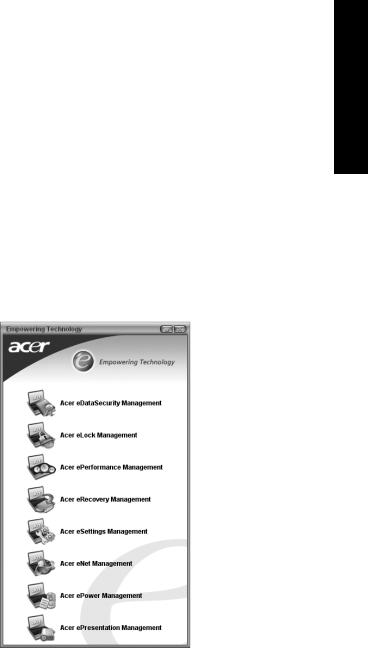
1
Acer Empowering Technology
Acer's innovative Empowering Technology makes it easy for you to access frequently used functions and manage your new Acer notebook. It features the following handy utilities:
•Acer eDataSecurity Management protects data with passwords and advanced encryption algorithms.
•Acer eLock Management limits access to external storage media.
•Acer ePerformance Management improves system performance by optimizing disk space, memory and registry settings.
•Acer eRecovery Management backs up/recovers data flexibly, reliably and completely.
•Acer eSettings Management accesses system information and adjusts settings easily.
•Acer eNet Management hooks up to location-based networks intelligently (for selected models).
•Acer ePower Management extends battery power via versatile usage profiles.
•Acer ePresentation Management connects to a projector and adjusts display settings conveniently.
Technology Empowering
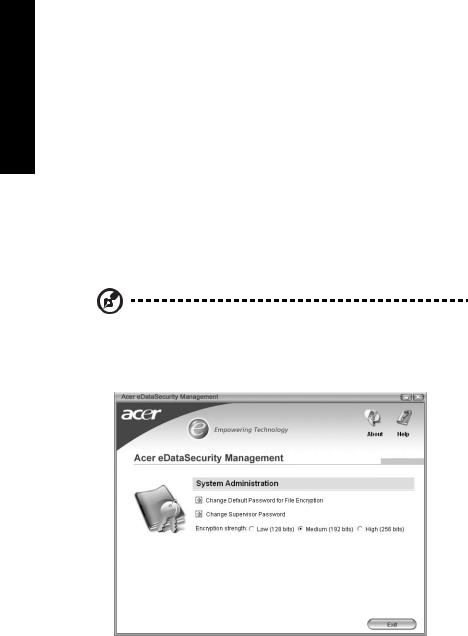
Empowering Technology
2
For more information, press the <  > key to launch the Empowering
> key to launch the Empowering
Technology menu, then click on the appropriate utility and select the Help function.
Acer eDataSecurity Management
Acer eDataSecurity Management is a handy file encryption utility that protects your files from being accessed by unauthorized persons. It is conveniently integrated with Windows Explorer as a shell extension for quick and easy data encryption/decryption and also supports on-the-fly file encryption for MSN Messenger and Microsoft Outlook.
There are two passwords that can be used to encrypt/decrypt a file: the supervisor password and the file-specific password. The supervisor password is a "master" password that can decrypt any file on your system; the file-specific password is assigned when you encrypt each individual file.
The Acer eDataSecurity Management setup wizard will prompt you for a supervisor password and default file-specific password. This file-specific password will be used to encrypt files by default, or you can choose to enter your own file-specific password when encrypting a file.
Note: The password used encrypt a file is the unique key that the system needs to decrypt it. If you lose the password, the supervisor password is the only other key capable of decrypting the file. If you lose both passwords, there will be no way to decrypt your encrypted file! Be sure to safeguard all related passwords!
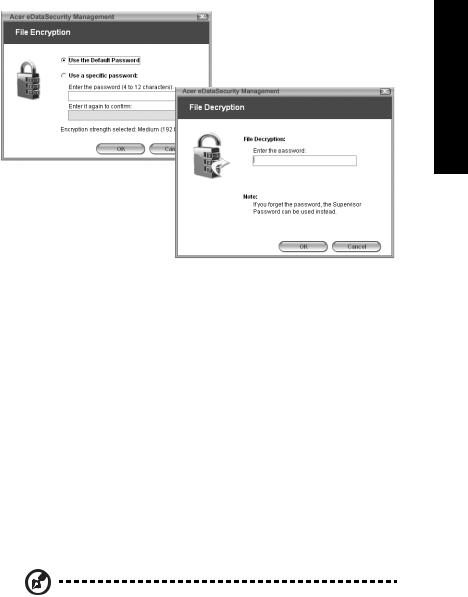
3
Technology Empowering
Acer eLock Management
Acer eLock Management is a security utility that allows you to lock up your removable data, optical and floppy drives to ensure that data can't be stolen while your notebook is unattended.
•Removable data devices — includes USB disk drives, USB pen drives, USB flash drives, USB MP3 drives, USB memory card readers, IEEE 1394 disk drives and any other removable disk drives that can be mounted as a file system when plugged into the system.
•Optical drive devices — includes any kind of CD-ROM or DVD-ROM drives.
•Floppy disk drives — 3.5-inch disks only.
To activate Acer eLock Management, a password must be set first. Once set, you may apply locks to any of the three kinds of devices. Lock(s) will immediately be set without any reboot necessary, and will remain locked after rebooting, until unlocked.
If you do not set a password, Acer eLock Management will reset back to the initial status with all locks removed.
Note: If you lose your password, there is no method to reset it except by reformatting your notebook or taking your notebook to an Acer Customer Service Center. Be sure to remember or write down your password.
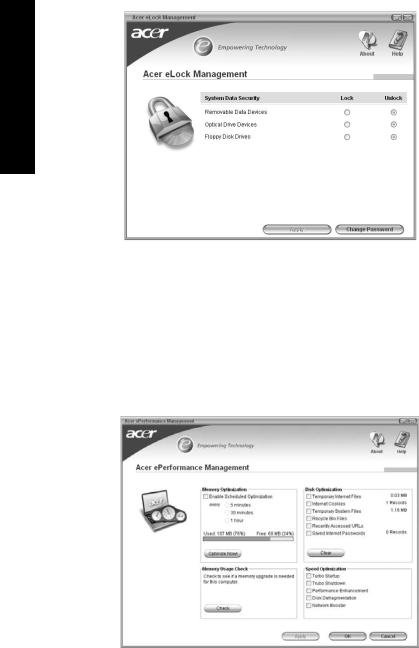
4
Empowering Technology
Acer ePerformance Management
Acer ePerformance Management is a system optimization tool that boosts the performance of your Acer notebook. It provides you with the following options to enhance overall system performance:
•Memory optimization — releases unused memory and check usage.
•Disk optimization — removes unneeded items and files.
•Speed optimization — improves the usability and performance of your Windows XP system.
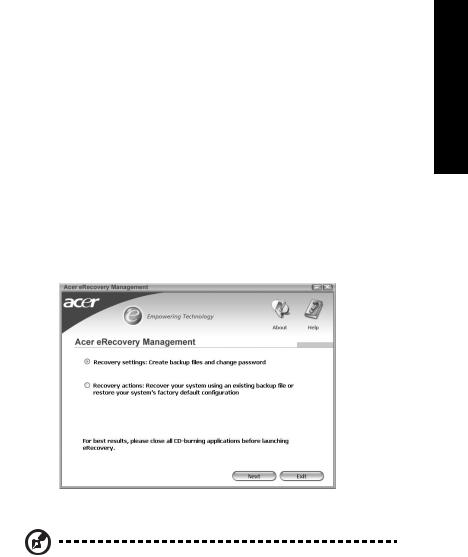
5
Acer eRecovery Management
Acer eRecovery Management is a powerful utility that does away with the need for recovery disks provided by the manufacturer. The Acer eRecovery Management utility occupies space in a hidden partition on your system's HDD. User-created backups are stored on D:\ drive. Acer eRecovery Management provides you with:
•Password protection.
•Recovery of applications and drivers.
•Image/data backup:
•Back up to HDD (set recovery point).
•Back up to CD/DVD.
•Image/data recovery tools:
•Recover from a hidden partition (factory defaults).
•Recover from the HDD (most recent user-defined recovery point).
•Recover from CD/DVD.
For more information, please refer to "Acer eRecovery Management" on page 49 in the AcerSystem User's Guide.
Note: If your computer did not come with a Recovery CD or System CD, please use Acer eRecovery Management's "System backup to optical disk" feature to burn a backup image to CD or DVD. To ensure the best results when recovering your system using a CD or Acer eRecovery Management, detach all peripherals (except the external Acer ODD, if your computer has one), including your Acer ezDock.
Technology Empowering
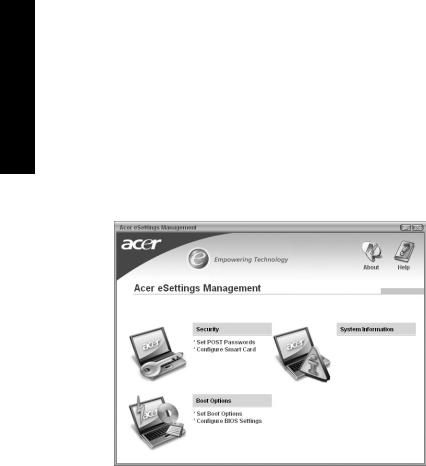
Empowering Technology
6
Acer eSettings Management
Acer eSettings Management allows you to inspect hardware specifications and to monitor the system health status. Furthermore, Acer eSettings Management enables you to optimize your Windows operating system, so your computer runs faster, smoother and better.
Acer eSettings Management also:
•Provides a simple graphical user interface for navigating through the program effortlessly.
•Displays general system status and advanced monitoring for power users.
•Logs when a hardware component has been removed or replaced.
•Permits you to migrate personal settings.
•Keeps a history log of all alerts that were previously issued.
Acer eNet Management (for selected models)
Acer eNet Management helps you to quickly and easily connect to both wired and wireless networks in a variety of locations. To access this utility, either click on the "Acer eNet Management" icon on your notebook, or start the program from the Start menu. You also have the option to set Acer eNet Management to start automatically when you boot up your PC.
Acer eNet Management automatically detects the best settings for a new location, while offering you the freedom to manually adjust the settings to match your needs, simply by right-clicking on the icon in the taskbar.
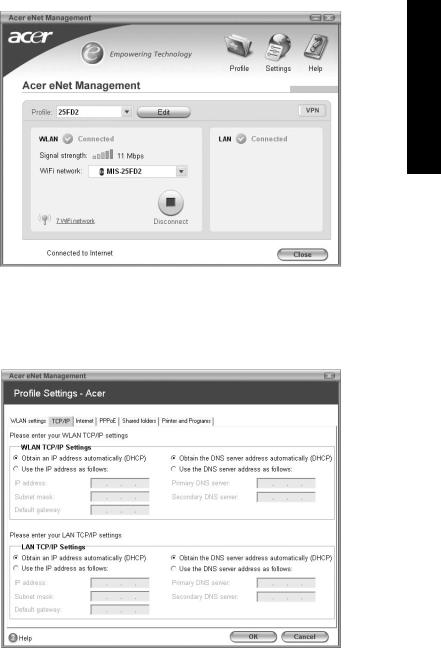
7
Technology Empowering
Acer eNet Management can save network settings for a location to a profile, and automatically apply the appropriate profile when you move from one location to another. Settings stored include network connection settings (IP and DNS settings, wireless AP details, etc.), as well as default printer settings. Security and safety concerns mean that Acer eNet Management does not store username and password information.
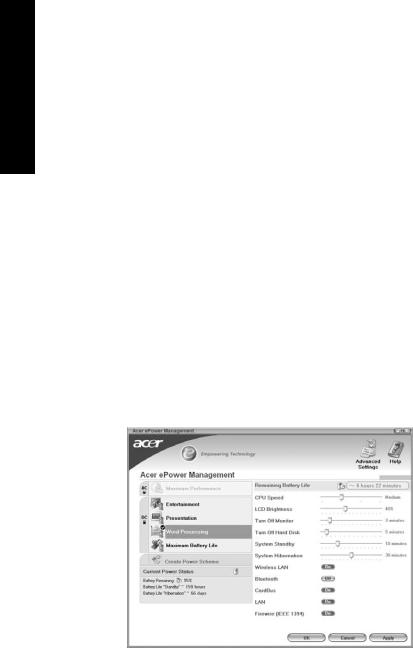
Empowering Technology
8
Acer ePower Management
Acer ePower Management features a straightforward user interface. To launch it, select Acer ePower Management from the Empowering Technology interface, or double-click the Acer ePower Management icon in the task tray.
AC mode
The default setting is "Maximum Performance." You can adjust CPU speed, LCD brightness and other settings, or click on buttons to turn the following functions on/off: Wireless LAN, Bluetooth, CardBus, Memory Card, Audio, and Wired LAN.
DC mode
To suit your usage, there are four pre-defined profiles — Entertainment, Presentation, Word Processing, and Maximum Battery. Or, you can define up to three of your own profiles.
Create new power scheme
1Assign a name for the new scheme.
2Choose existing scheme to use as a template.
3Select whether used for mains (AC) or battery mode.
4Choose which power options best fit your needs, then click OK.
5The new profile will appear on the main screen.
Battery status
For real-time battery life estimates based on current usage, refer to the panel on the lower left-hand side of the window.
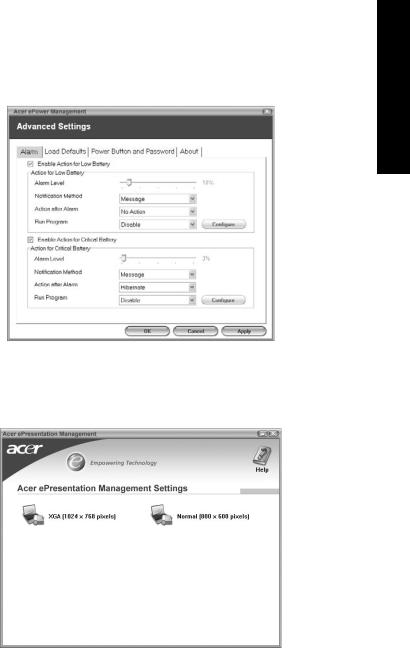
You can also click "Advanced Settings" to:
•Set alarms.
•Re-load factory defaults.
•Select what actions will be taken when the cover is closed, and set passwords for accessing the system after Hibernation or Standby.
•View information about Acer ePower Management.
9
Technology Empowering
Acer ePresentation Management
Acer ePresentation Management lets you select from two of the most common projector resolutions: XGA and SVGA.

10
Empowering Technology
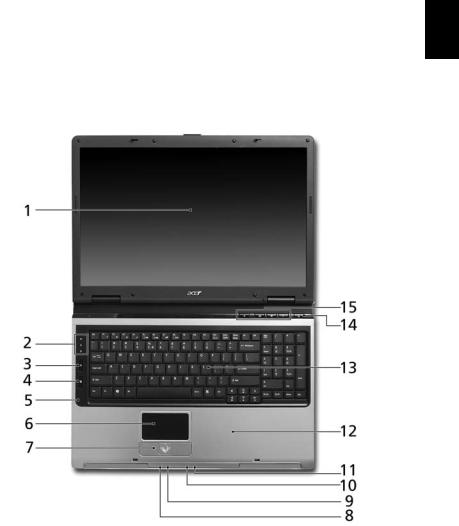
11
Your Acer notebook tour
After setting up your computer as illustrated in the Just for Starters... poster, let us show you around your new Acer notebook.
Front view
English
# |
Icon Item |
Description |
1 |
Display screen |
Also called Liquid-Crystal Display (LCD), |
|
|
displays computer output. |
|
|
|
2 |
Status indicators |
Light-Emitting Diodes (LEDs) that light up to |
|
|
show the status of the computer's functions |
|
|
and components. |
|
|
|

English
12
# |
Icon |
Item |
Description |
||
3 |
|
|
|
Wireless |
Enable/disables the wireless function. |
|
|
|
|
communication |
Indicates the status of wireless LAN |
|
|
|
|
button |
communication. |
|
|
|
|
|
|
4 |
|
|
|
Bluetooth |
Enable/disables the Bluetooth function. |
|
|
|
|
communication |
Indicates the status of Bluetooth |
|
|
|
|
button |
communication. |
|
|
|
|
|
|
5 |
|
|
|
Microphone |
Internal microphone for sound recording. |
|
|
|
|
|
|
6 |
|
|
|
Touchpad |
Touch-sensitive pointing device which |
|
|
|
|
|
functions like a computer mouse. |
|
|
|
|
|
|
7 |
|
|
|
Click buttons (left, |
The left and right buttons function like the |
|
|
|
|
center and right) |
left and right mouse buttons; the center |
|
|
|
|
|
button serves as a 4-way scroll button. |
|
|
|
|
|
|
8 |
|
|
|
Power indicator |
Indicates the computer's power status. |
|
|
|
|
|
|
9 |
|
|
|
Battery indicator |
Indicates the computer's batttery status. |
|
|
|
|
|
|
|
|
|
|
|
|
10 |
|
|
|
Bluetooth |
Indicates the status of Bluetooth |
|
|
|
|
communication |
communication. |
|
|
|
|
indicator |
|
|
|
|
|
|
|
11 |
|
|
|
Wireless |
Indicates the status of wireless LAN |
|
|
|
|
communication |
communication. |
|
|
|
|
indicator |
|
|
|
|
|
|
|
12 |
|
|
|
Palmrest |
Comfortable support area for your hands |
|
|
|
|
|
when you use the computer. |
|
|
|
|
|
|
13 |
|
|
|
Keyboard |
For entering data into your computer. |
|
|
|
|
|
|
14 |
|
|
|
Power button |
Turns the computer on and off. |
|
|
|
|
|
|
15 |
|
|
|
Easy-launch |
Buttons for launching frequently used |
|
|
|
|
buttons |
programs. See "Easy-launch buttons" on |
|
|
|
|
|
page 22 for more details. |
|
|
|
|
|
|

Closed front view
13
English
# |
Icon |
Item |
Description |
|
1 |
|
|
Speakers |
Left and right speakers deliver stereo |
|
|
|
|
audio output. |
|
|
|
|
|
2 |
|
|
Line-in jack |
Accepts audio line-in devices (e.g., audio |
|
|
|
|
CD player, stereo walkman). |
|
|
|
|
|
3 |
|
|
Microphone-in jack |
Accepts input from external |
|
|
|
|
microphones. |
|
|
|
|
|
4 |
|
|
Headphones/speaker/ |
Connects to audio line-out devices (e.g., |
|
|
|
line-out jack with |
speakers, headphones). |
|
|
|
S/PDIF support |
|
|
|
|
|
|
|
|
|
|
|
|
|
|
|
|
5 |
|
|
Latch |
Locks and releases the lid. |
|
|
|
|
|
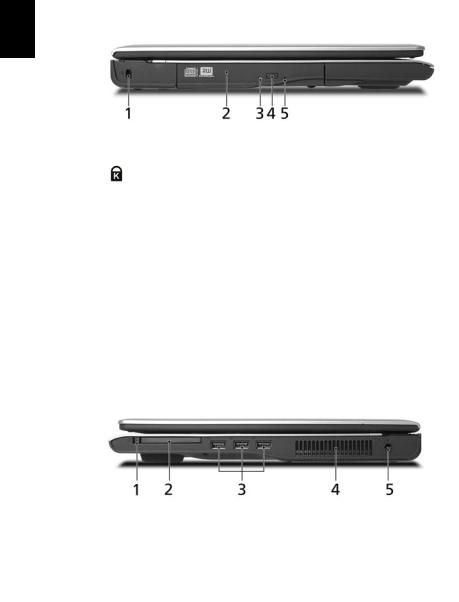
English
14
Left view
# |
Icon |
Item |
Description |
1 |
|
Kensington lock |
Connects to a Kensington-compatible |
|
|
slot |
computer security lock. |
|
|
|
|
2 |
|
Optical drive |
Internal optical drive; accepts CDs or DVDs |
|
|
|
(slot-load or tray-load depending on model). |
|
|
|
|
3 |
|
Optical disk access |
Lights up when the optical drive is active |
|
|
indicator |
(location depends on model). |
|
|
|
|
4 |
|
Optical drive eject |
Ejects the optical disk from the drive |
|
|
button |
(location depends on model). |
|
|
|
|
5 |
|
Emergency eject |
Ejects the optical drive tray when the |
|
|
hole |
computer is turned off |
|
|
|
(location depends on model). |
|
|
|
|
Right view
# Icon |
Item |
Description |
|||||
1 |
|
|
|
|
|
PC Card slot eject |
Ejects the PC Card from the slot. |
|
|
|
|
|
|
button |
|
|
|
|
|
|
|
|
|
2 |
|
|
|
|
|
PC Card slot |
Accepts one Type II PC Card. |
|
|
|
|
|
|
|
|
|
|
|
|
|
|
|
|
